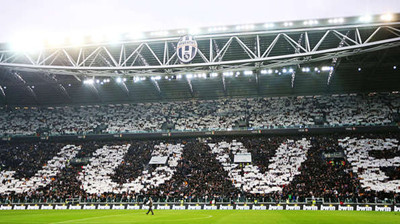意大利足球
More than just trophy assets
不僅僅是擺設(shè)
The country's largest clubs are belatedly becoming more businesslike
該國個(gè)大俱樂部的效率化進(jìn)程姍姍來遲
FOR all their fans' passion, Italian football clubs struggle to make profits. In the 1990s Italy's Serie A was the most glamorous and high-profile of Europe's five main football leagues; it has since fallen, in revenue terms, from second to fourth place. In this year's Football Money League, published on January 22nd by Deloitte, a consulting firm, three of the four Italian clubs in the worldwide top 20 dropped at least one position. However, there are signs of a turnaround in the clubs' fortunes.
盡管意大利球迷非常狂熱,但是它的足球俱樂部依然難以盈利。在上世紀(jì)九十年代,意甲是歐洲五大足球聯(lián)賽當(dāng)中最富魅力、最高調(diào)的聯(lián)賽;自此以后,它的收益能力就從第二位下滑到了第四位。1月22日,由德勤咨詢公司發(fā)布的本年度足球財(cái)富榜里,在全球前20名之內(nèi)的四所意大利俱樂部當(dāng)中,有三所至少下降了一個(gè)位次。不過,俱樂部的命運(yùn)有轉(zhuǎn)機(jī)的跡象。

Italy's league fell behind its peers partly because of the complacency of clubs' owners. Tycoons treated them as trophy assetsmore than businesses. The clubs suffered chronic losses and corruption scandals, and their stadiums were left to decay. But Italy's sustained economic downturn and the introduction by UEFA, European football's governing body, of rules to stop clubs habitually spending more than they earn, have been among the main reasons why a number of clubs have changed hands. Foreign investors are trickling in.
意大利聯(lián)賽落于同輩之后的一大原因是俱樂部所有者的驕傲自滿。業(yè)界大亨們將他們看作是身份的象征而不是一門生意。俱樂部遭受長期虧損以及腐敗丑聞的影響,他們的體育場(chǎng)因此雜草蔓生。不過,大批俱樂部被轉(zhuǎn)手的兩個(gè)主要原因是:1、意大利經(jīng)濟(jì)的持續(xù)低迷;2、歐洲足球管理機(jī)構(gòu)——?dú)W足聯(lián)引入了一系列規(guī)則來阻止俱樂部習(xí)慣性地入不敷出。外國投資者正慢慢涌向這一領(lǐng)域。
For those seeking to turn around a club's finances, one of the most important tasks is to boost match-day takings, which account for 11% of total revenues in Serie A, compared with 23% in both the English Premier League and the German Bundesliga. That means improving the match-day experience. However, few Italian clubs own the stadiums they play in, and unlike in Britain and Germany, where official encouragement and incentives have led to stadiums being upgraded, Italian ones largely remain in a poor state.
對(duì)于那些尋求扭轉(zhuǎn)俱樂部財(cái)務(wù)狀況的人來說,提高比賽日收入是最重要的任務(wù)之一。與英超和德甲的23%相比,比賽日收入占了意甲總收入的11%。這意味著要提高觀賽日的體驗(yàn)。但是,少數(shù)意大利俱樂部擁有他們自己的場(chǎng)館,與之不同的是,英國和德國的官方鼓勵(lì)和激勵(lì)措施使得足球場(chǎng)地可以得到翻新,而這些意大利的運(yùn)動(dòng)場(chǎng)館大多狀態(tài)不佳。
There is plenty of money coming in from television: the amount that broadcasters pay to show Italian football matches is second only to that in England. However, Italian clubs are missing a few other tricks. For instance, they do not get much from renting out VIP boxes at their grounds on match days: Italian businesspeople tend to take clients to dinner or the opera; and to persuade them to start bringing them to football matches, the facilities at grounds would need to be improved. Also, unlike England's top clubs, Italian ones have not been good at conning their fans into buying overpriced team strips.
有一大筆錢來自電視:電視臺(tái)轉(zhuǎn)播意大利足球賽的付費(fèi)金額僅次于英國。不過意大利俱樂部缺少一些其他的技巧。比如說,在比賽日里,他們不能從出租場(chǎng)地中貴賓包廂這一項(xiàng)上得到可觀的收益:意大利商人往往邀請(qǐng)客戶共進(jìn)晚餐或者觀賞歌劇;想讓意大利人帶客戶來看足球賽的話,場(chǎng)地設(shè)施還需要好好改善。不僅如此,不同于英國的俱樂部,意大利俱樂部不擅長組織球迷購買高價(jià)的球衣隊(duì)服。
But the tide could turn soon. Italy's top performer is Juventus, owned by the Agnelli family, whose forebears founded Fiat. The Turin-based club opened a new, 41,000-capacity stadium in 2011; it has since more than trebled its match-day revenues. Two other teams, Sassuolo and Udinese, have since embarked on revamping their stadiums, and AS Roma plans to build itself a new home on the outskirts of the eternal city.
但是這股浪潮即將被扭轉(zhuǎn)。阿涅利家族祖先成立了菲亞特公司,而意大利的頂級(jí)球隊(duì)尤文圖斯就所屬于這個(gè)家族。這個(gè)位于都靈市的俱樂部在2011年開放了一處可容納41000人的新場(chǎng)地;這比比賽日收益的三倍還要多出部分。其他兩支隊(duì)伍,薩索洛和烏迪內(nèi)斯隊(duì)已經(jīng)著手改造他們的體育館了,而且羅馬隊(duì)打算在羅馬市郊修建一處新的大本營。
Efforts are being made to earn more from foreign sources. Over the past five years the Supercoppa, the opening match of the season, has been played three times in China and once in Qatar. AS Roma, bought by a group of American investors in 2011, has since struck a ten-year kit-sponsorship deal with Nike. In 2013 Erick Thohir, an Indonesian businessman, acquired 70% of Inter Milan, bringing in a clutch of foreign executives to boost the brand globally: of Inter's 280m fans, 60% live in Asia, including 18m in Indonesia.
為了獲取外國資源,意大利的俱樂部也是做足了努力。在過去五年中,作為賽季揭幕戰(zhàn)的超級(jí)杯,已經(jīng)在中國舉辦三次、在卡塔爾舉辦了一次。羅馬隊(duì)自2011年被一群美國投資者收購以后,就與耐克簽訂了為期十年的球衣贊助協(xié)議。在2013年,一位印尼商人雅立多斯獲得了國際米蘭70%的股份,并且?guī)砹艘槐娡鈬吖埽麄兇蛩銓⑺蛟斐蓢H品牌:在國際米蘭2.8億球迷當(dāng)中,60%居住在亞洲,其中1800萬在印尼。
Harry Philp of Portland Advisers, a consulting firm which advises on sports infrastructure, predicts that more Italian football teams could soon be welcoming foreign investors. Their expertise in running a profitable business will be as welcome as their money.
波特蘭顧問是一家專門為體育基礎(chǔ)建設(shè)提供建議的咨詢公司,它的雇員哈利·飛利浦預(yù)言,更多的意大利足球隊(duì)將會(huì)歡迎國外的投資者。他們?cè)诠芾碛馍系膶I(yè)水準(zhǔn)將和他們的投資一樣大受歡迎。譯者:盧意 校對(duì):胡靚












